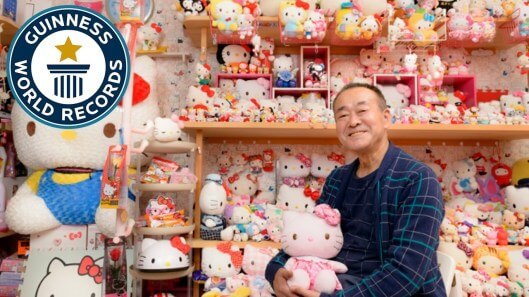“We (the U.S.) have dropped two atomic bombs on fuckin’ Japan and they’ve been drawing Hello-Kitty and shit ever since.”
~ Comedian, Dave Chappelle
A book published in 1900 entitled, Bushido: The Soul of Japan, outlines the principles of manhood according to Japan’s warrior class. The author, Inazo Nitobe, claims Bushido’s “8 Virtues” (Justice, Courage, Benevolence, Etiquette, Honesty, Honor, Loyalty, and Self-Control) were society’s measuring stick for any boy aspiring to become a man of standing. Although some scholars have criticized Nitobe’s work as a “romanticized yearning for a non-existent age of chivalry, ” Tim Clark, author of the Swordless Samurai, claims “there’s no question that his (Nitobe’s) work builds on extraordinary thousand-year-old precepts of manhood that originated in chivalrous behavior.”
If Japanese society had been aspiring to live up to the precepts of Bushido for thousands of years prior to World War II and, following the war in a span of less than fifty years, the men abandoned this warrior credo in favor of collecting Hello-Kitty dolls, it would be difficult to disagree with Dave Chappelle’s claim that “the U.S. bombed the masculinity out of an entire continent” (Asia).
But is this true?
Until WWII, Europeans were still openly regarded as barbarians who were 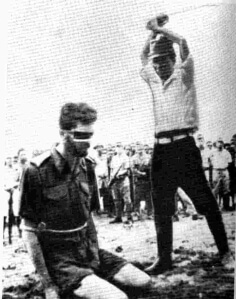 unfit to live in civilized society. beheaded.jpgAlthough this opinion may still exist within some right-wing circles, in the mainstream, the western powers—especially America—are viewed in a positive light. So, how exactly did the western man’s image transform from an uncivilized savage to the custodian of knowledge, culture, and ethics in a mere few decades? Is this solely the result of two nuclear bombs? Or, are there other factors at work?
unfit to live in civilized society. beheaded.jpgAlthough this opinion may still exist within some right-wing circles, in the mainstream, the western powers—especially America—are viewed in a positive light. So, how exactly did the western man’s image transform from an uncivilized savage to the custodian of knowledge, culture, and ethics in a mere few decades? Is this solely the result of two nuclear bombs? Or, are there other factors at work?
“Has Japan and other Asians sold-out to western values?”
“Selling out” is a common idiomatic pejorative expression for the compromising of a person’s integrity, morality, authenticity, or principles in exchange for personal gain, such as money, fame, or acceptance. According to Wikipedia, sell-outs are divided into three main categories: politics, music, and other forms of entertainment. However, for the melanin-rich, this term has a different application—one which is far more personal. Uncle Toms, coons, buffoons, and Sambos are very negative, stereotypical images. But what about Asians? Can Asians be sell-outs too?
TWINKIES
“Most Asian-Americans who are assimilated will have heard the term at some point, particularly in more populated areas, or in college,” says Gaitsiri Mongkolsmai Lin, who describes herself as an introverted Thai-American. “Whether or not someone will take offense is entirely up to the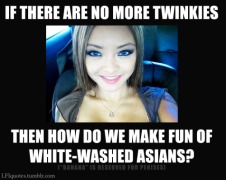 individual.”twinkies Journalist/Editor, Victoria Hudson has a stronger opinion. “Twinkies is to Asians as Oreo is to blacks. It’s highly offensive, yet shows the self-hatred of Asians and blacks, who refuse to allow others to be themselves…what is meant by “acculturated”—that’s double-speak for “trying to be white”, a term often stated by those who have bought into the racist notion that the whites have exclusivity to language, arts, sports, culture. People who refuse to allow people to be themselves—and to grow based on their surroundings—are the most narrow-minded, backwards-thinking individuals alive.”
individual.”twinkies Journalist/Editor, Victoria Hudson has a stronger opinion. “Twinkies is to Asians as Oreo is to blacks. It’s highly offensive, yet shows the self-hatred of Asians and blacks, who refuse to allow others to be themselves…what is meant by “acculturated”—that’s double-speak for “trying to be white”, a term often stated by those who have bought into the racist notion that the whites have exclusivity to language, arts, sports, culture. People who refuse to allow people to be themselves—and to grow based on their surroundings—are the most narrow-minded, backwards-thinking individuals alive.”
One of the determining factors which identifies Asians as twinkies is their choice of lovers. To this day, Hong Kong does not officially pay tribute to their country’s most famous celebrity, Bruce Lee. Although many claim this has more to do with the fact his mother was half German or the controversy surrounding his death (i.e. were illicit drugs or gangsters involved?), more than a few of the Asians I spoke with at least mentioned his wife.
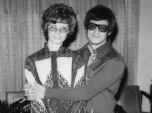
If the people of Hong Kong do not recognize Lee as as their brethren, it seems that he would not qualify as a sellout; but according to Isaiah Pablo, who describes himself as a huge Bruce Lee fan, “They (Chinese filmmakers) all painted him (Lee) as a Hollywood sellout and an arrogant punk.” Lucy Liu, Brenda Song, and even Tiger Woods—who also may qualify as an Oreo—head a long-list of famous Asians who have married Caucasians. As a child, I have to admit that I was tempted to fall into this narrow mindset. That is, until I found out that some of the most soulful, respected brothers like James Brown and Don Cornelius had white wives. It also struck me as odd that white men like Robert De Niro and David Bowie never seemed to become stigmatized for marrying outside their race.
IS IT NECESSARY TO SELLOUT IN ORDER TO “MAKE IT?”
Because the truth is, the level of your happiness is exactly proportional to the amount you’ve sold yourself out.
“The need to assimilate was a way to be seen as American and to be accepted,” claims Dr. Ellen D. Wu, who is a history professor at Indiana University Bloomington and author of the book The Color of Success: Asian-Americans and the Origins of the Model Minority. In an interview she explains how assimilation was a necessity created by segregation.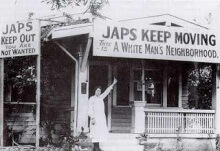 japs “Beginning in the late 19th century and really through the 1940s and ’50s, there was what we can call a regime of Asian exclusion: a web of laws and social practices and ideas designed to shut out Asians completely from American life.” Examples of this are the U.S. Chinese Exclusion Act and the incarceration of Japanese-Americans. Racist episodes such as these eventually led to ethnic enclaves like Chinatowns, Japantowns, Koreatowns and Little Saigons. Kristi Yamaguchi, a Japanese-American Olympic ice-skater, says “I see myself as a Twinkie…I think it’s not necessarily seeing yourself as white. It’s just identifying as American.”
japs “Beginning in the late 19th century and really through the 1940s and ’50s, there was what we can call a regime of Asian exclusion: a web of laws and social practices and ideas designed to shut out Asians completely from American life.” Examples of this are the U.S. Chinese Exclusion Act and the incarceration of Japanese-Americans. Racist episodes such as these eventually led to ethnic enclaves like Chinatowns, Japantowns, Koreatowns and Little Saigons. Kristi Yamaguchi, a Japanese-American Olympic ice-skater, says “I see myself as a Twinkie…I think it’s not necessarily seeing yourself as white. It’s just identifying as American.”
Elliott Mason, a white blogger from Chicago who claims he is learning to be “anti-racist,” believes “All of these dismissive or demeaning terms can—under some circumstances—be loving and community-building from one in-group member to another. (However), none are ever appropriate when used by someone from OUTSIDE the group, someone who’s never been called that term in hatred. An Asian-American blogger, ZC Lee, had this to say: “Why do people keep inventing stupid labels for others? Labeling someone is like giving them a scarlet letter; it’s pointless. Who cares if a person of Asian, black, or white descent doesn’t act like a stereotypical person of their race? Do people that use labels expect all Asians to act the same? All blacks to act the same, etc? No need to label anyone, outcast them, or put them in the spotlight. Just worry about your life!”
Takuan Amaru is the author of Gaikokujin – The Story.

